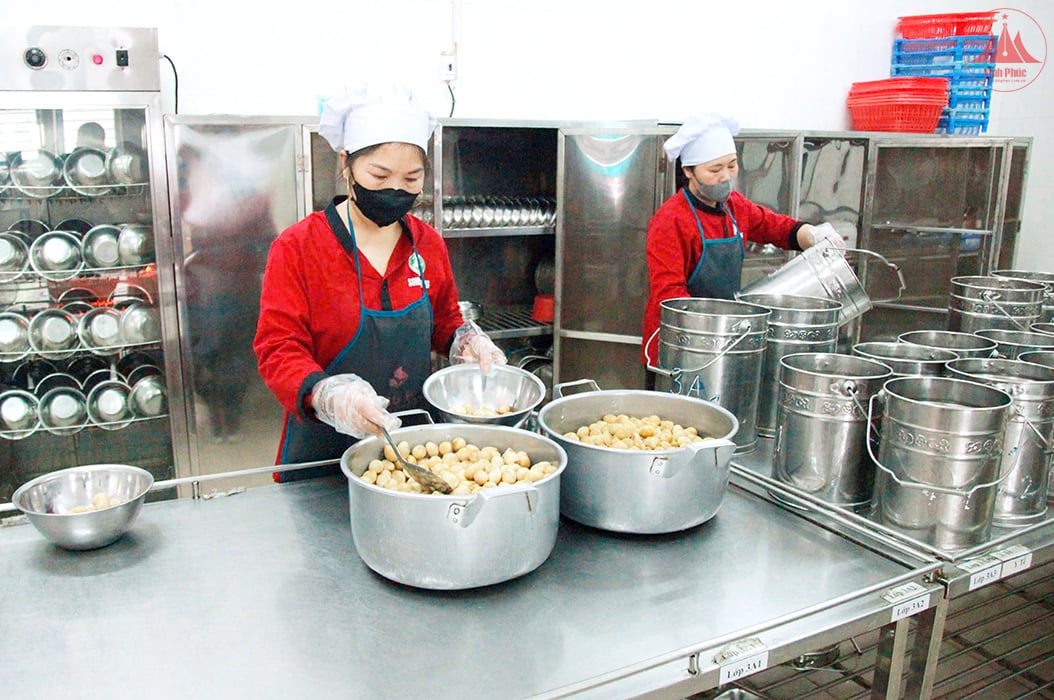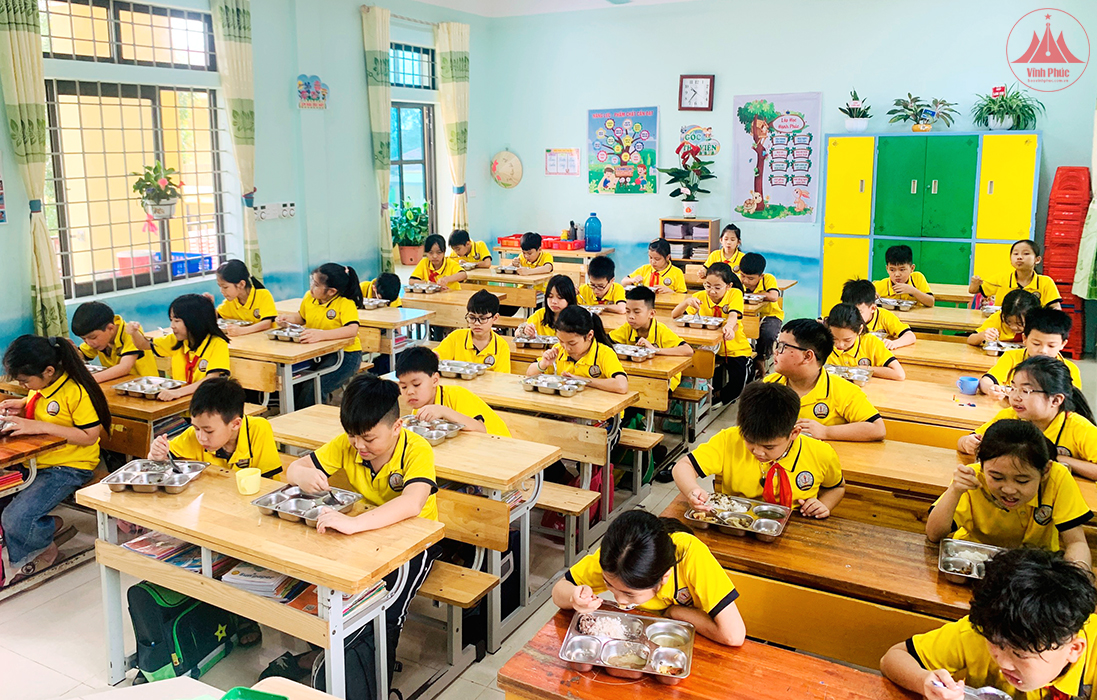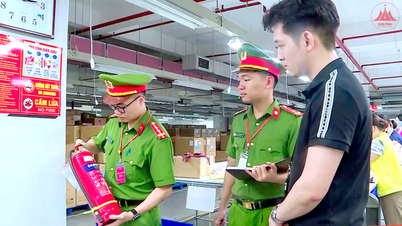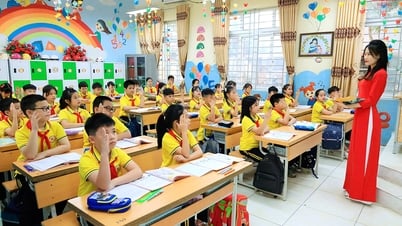Hoa Sen Kindergarten (Vinh Yen) has 550 students in 19 classes, aged 24 - 72 months; the rate of children eating at school is nearly 91%. Teacher Nguyen Thi An, the school's principal, said: "Currently, the school is contracting with Song Duong Production and Trading Joint Stock Company, Dong Anh District (Hanoi) to provide meals cooked at the school.
To ensure food safety and improve the quality of meals for students, the school's Board of Directors assigned a Vice Principal to be responsible for directly supervising the kitchen operations, checking input materials and processing stages, dividing meals, keeping food samples; checking equipment and tools for processing activities, protective clothing for kitchen staff, and regularly monitoring children's health.
Food used to prepare meals is always guaranteed to be fresh, safe, sufficient in quantity, of clear origin, and certified to ensure food safety according to regulations.
The school kitchen area is operated according to a “one-way” process with separate functional areas arranged neatly and tidily. The cooking process from preparation to processing, preservation, and sample storage is carried out in accordance with food safety regulations, with the participation and supervision of parents.
Through extracurricular activities and lessons, homeroom teachers regularly teach children about the important role of balanced nutrition for the body, the dangers of using unsafe foods and the harmful effects of processed foods on health.
Currently, every day, the boarding kitchen of Tam Hong 1 Primary School, Tam Hong Town (Yen Lac) provides more than 800 meals for students. Ms. Chu Thi Huy, Vice Principal of the school said: "To ensure the quality of boarding meals, the school always focuses on implementing the "10 golden principles" from the stage of importing ingredients and the stages of processing and organizing boarding meals for students.
The meal menu is built with diverse and rich dishes, ensuring adequate quality and quantity according to age. Kitchen staff are fully equipped with protective clothing and regularly attend training to improve their knowledge of food safety and hygiene.
Water samples used for food preparation are tested annually by the authorities. Water used for cooking comes from the school's two water filters located in the kitchen area. Thanks to the focus on ensuring the quality of boarding meals, students are very excited and enjoy their lunch at school.
In the 2024-2025 school year, the rate of underweight and malnourished students and overweight and obese students decreased by 0.67% and 0.58% respectively compared to the previous school year. However, the school's kitchen is currently not able to operate according to a one-way process due to limited space and not meeting the requirements according to regulations.
According to statistics from the Department of Education and Training, the province currently has 336 schools at all levels organizing boarding meals at school in the form of the school cooking itself or contracting with a unit providing meals to cook at the school or contracting with a unit providing meals but not cooking at the school.
Of which, there are 180 preschool schools; 138 primary schools; 9 primary and secondary schools; 8 secondary schools and 1 high school that organizes boarding meals.
Deputy Head of the General Education Department, Department of Education and Training Truong Quang Cuong said: “To ensure food safety in schools, educational institutions and parents have closely coordinated to improve the quality of boarding meals, control food ingredients and processing procedures to ensure safety.
The Department of Education and Training regularly coordinates with the Department of Health to disseminate legal regulations on food safety, improve knowledge and sense of responsibility for managers, teachers and staff in charge of catering work at schools.
In addition to the achieved results, ensuring food safety in school kitchens still faces difficulties due to limited facilities, equipment and utensils in some kitchens. The awareness, knowledge and skills of a number of kitchen staff directly involved in food preparation and processing do not meet the requirements according to regulations.
Food safety management at schools that organize meals for boarding students but do not cook at school is difficult. The situation of students arbitrarily buying and using candies and processed foods at school gates that can cause poisoning still occurs.
To improve the effectiveness of food safety work in schools, functional sectors and localities promote propaganda, education and dissemination of food safety knowledge to teachers, staff of collective kitchens, parents and students of schools.
At the same time, coordinate inspection, supervision, and detection of violations to strictly handle them according to regulations; improve the quality of meals combined with scientific and reasonable physical and sports activities to improve students' overall physical and mental strength.
Quynh Huong
Source: http://baovinhphuc.com.vn/Multimedia/Images/Id/126996/Dam-bao-an-toan-thuc-pham-tai-bep-an-truong-hoc




![[Photo] Prime Minister Pham Minh Chinh meets with US business representatives](https://vphoto.vietnam.vn/thumb/1200x675/vietnam/resource/IMAGE/2025/5/13/5bf2bff8977041adab2baf9944e547b5)
![[Photo] President Luong Cuong attends the inauguration of the international container port in Hai Phong](https://vphoto.vietnam.vn/thumb/1200x675/vietnam/resource/IMAGE/2025/5/13/9544c01a03e241fdadb6f9708e1c0b65)





















































































Comment (0)